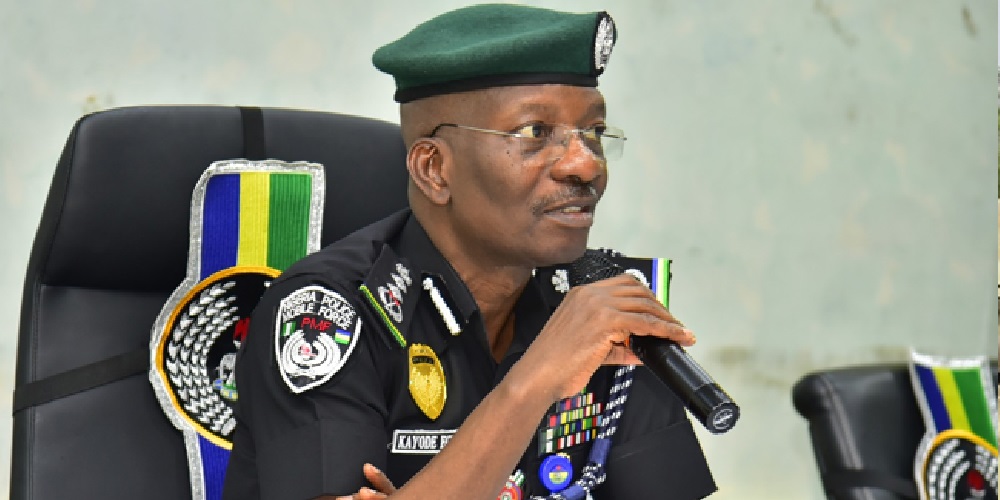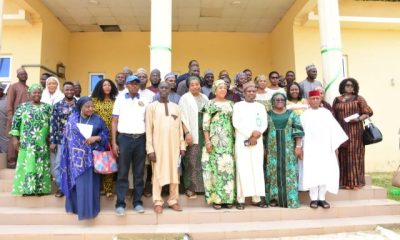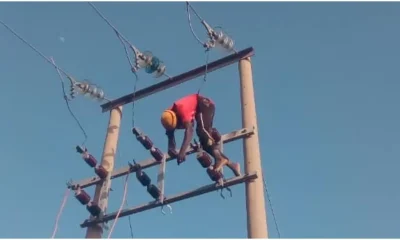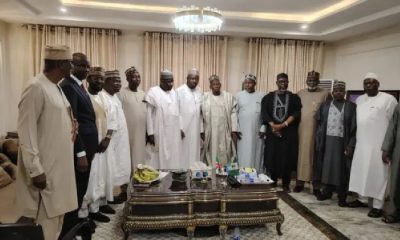News
IG deploys mobile unit to rescue kidnapped pupils in Kaduna

The Inspector General of Police, Kayode Egbetokun, has directed the immediate deployment of a mobile police unit to Kuriga community, Chikun Local Government Area of Kaduna State.
Over 280 students of the LEA Primary School Kuriga, Chikun Local Government area of Kaduna state, were kidnapped penultimate week.
According to a statement by the Force Public Relations Officer, ACP Olumuyiwa Adejobi, Egbetokun announced the deployment when he visited the state to assess the situation firsthand, in the company of the Deputy Inspector General in charge of the Force Intelligence Department, Habu Sani, on Tuesday.
He sympathised with the people and the Governor of Kaduna State, Senator Uba Sani, while stating the dedication of the NPF to ensure the rescue of the abducted students, using both kinetic and non-kinetic approaches.
“Following the distressing abduction of school students in Kaduna, the Inspector-General of Police, IGP Kayode Egbetokun, along with the DIG in charge of the Force Intelligence Department, Habu Sani, DIG Department of Operations Ede Ayuba Ekpeji, AIG Police Mobile Force Yekini Adio Ayokui, and other senior officers undertook a visit to the state to assess the situation firsthand.
“The IGP reiterated the dedication of the Nigeria Police Force to ensuring the safe rescue of all the abducted students, assuring that both kinetic and non-kinetic approaches are being vigorously pursued to secure the release of the students and bring the perpetrators to justice.
Responding, the Kaduna State Governor promised the support of the state government for the deployed mobile police unit while calling on members of the media to ensure responsible journalism through the period of the crisis.
As part of his visit, the IGP also met with police officers at the Police Command and the Police College, Kaduna, and addressed their concerns while assuring them of the Force’s unwavering commitment to their welfare, “to bequeath to Nigerians a police institution that is service-driven, professionally competent, people-friendly, and rule of law compliant for a more secure environment in Nigeria.”
Egbetokun also noted the critical nature of the task ahead of the Nigeria Police Force, which he said will be carried out assiduously to ensure the safety and security of all citizens.
He urged the public to remain calm and cooperate with the Police and other relevant security agencies in the tireless duty towards a swift resolution of the present security challenges in our dear country.
News
Oborevwori /Okowa: PDP experiencing a rebirth and will soon bounce back-Saraki declares

Former Senate President, Dr Bukola Saraki has said
Peoples Democratic Party PDP is experiencing a rebirth and would soon bounce back.
He said those who want to leave should be allowed to go to enable the party reposition itself.
Saraki made this disclosure in a statement he personally signed on Thursday night saying:
“Following the development in the Delta State Chapter of our party, the Peoples Democratic Party (PDP), I have been inundated with phone calls from leaders and members of our party as well as various youths who have been active in promoting democracy and good governance in our country.
“Many of the callers want to know what my reaction is to the defection of top PDP leaders in Delta State and its impact on our party.
“My view is that those who want to leave the PDP should leave now and let the rest of us who want to stay concentrate on rebuilding the party and refocusing it to play the role of a viable opposition that will provide a better alternative for the good people of Nigeria.
“I am convinced that it is important for all Nigerians to work for the sustenance of democracy. And to sustain democracy, there must be viable choices for people at every point. Also, there must be a viable opposition to keep people’s hope alive and create credible alternatives to keep the government on its toes.
” A one-party state as being disingenuously designed by some people will not augur well for a multi-ethnic, multi-lingual, multi-cultural, multi-religious, and highly diversified society like ours. It is even more dangerous when we eliminate alternatives and make people hopeless.
“Therefore, it is in the interest of Nigeria and the survival of our democracy for the opposition to be vibrant and strong enough with the capacity to replace the ruling party at any point.
“Thus, my charge to our party members is that the PDP is merely experiencing a rebirth. Those who want to leave the party should go and let those of us remaining have a clear view of who we are talking to and where their political loyalty lies. All we need is for those who want to stay back in PDP to show commitment and we can all work to rebuild the party.
“This development has vindicated the stance of people like me who have decided to remain silent and watch events unfold. I have seen that there was no sincerity with supposed leaders of the opposition. One was not sure of the next person one was talking to.
“My appeal to PDP members nationwide is that we should know that the sustenance of democracy is not a sprint. Rather, it is a marathon. It is not a knock-out football match series. It is a league. 24 hours is a long time in politics and nobody can predict how the dynamics will evolve in the coming weeks and months.
” That is why PDP members across the country should not be discouraged, disillusioned, disappointed, or demoralised by the development in Delta State. We should stay strong and focus on strengthening the party. It is not necessary at this point to lament why they left.
“Our party members should also refrain from blaming our woes on the ruling party. That would be a lazy approach. They are playing politics to win elections. It is our responsibility as party members to ignore their antics and seize the moment and momentum to make our party stronger and better.
“Yes, it is unbecoming and shocking for the running mate to the standard bearer of a leading party to abandon ship to join the ruling party. This is unprecedented and nobody should try to justify such an act with the talk of being put under pressure. It is simply a sign of how low we have sunk as a polity. The country is experiencing a collapse of leadership values.
“These developments in the polity are the reason why I have always canvassed the idea that we should emphasize building and strengthening our institutions and not individuals. With the defection of the governor of Delta State, even if the party has only ten governors in its fold, the PDP is still in a good position to win the next round of elections..
“Our numerous party members should know that the PDP is better with fewer members who are loyal, sincere, determined, dedicated, and committed to its ideas, ideals, and progress than to have so many who will identify with us in the afternoon and be romancing the ruling party in the night.
“We still have about two years before the next election. That is a long time in politics. We have enough time to brace up to the challenge. There is nothing that prevents us from getting some governors from the other parties to join our ranks.
“My appeal to our young party members is that this defection is just a mere challenge to us to further mobilize and put our house in order. Also, our women’s wing should seize the opportunity to help in the rebuilding mission. The PDP will come out stronger from this development.
“I am very sure the various leadership organs of our party will soon make public their reaction to this development and convey the necessary meetings to strategize on how to strongly and strategically respond to it. Therefore there is no cause for alarm.
“Our party members should not lose focus, hope, or the determination to win. We should see the current development as a challenge to rebuild and refocus the party. Tomorrow is very bright.
News
NYSC to Deploy Corps Members to NDLEA Rehabilitation Centres

The director general of the National Youth Service Corps (NYSC), Brigadier General Olakunle Nafiu, Thursday, acceded to the request of the National Drug Law Enforcement Agency (NDLEA) chairman, Brigadier General Buba Marwa (rtd) for the scheme to deploy corps members with relevant qualifications to the agency’s counselling and rehabilitation centres nationwide.
General Marwa said such centres are already in existence in 30 states with plans to establish seven more in a bid to ensure that the 36 states and the FCT have one each.
The NDLEA boss made this request when the NYSC director general paid a courtesy visit to his office in Abuja. Marwa called for a Memorandum of Understanding (MoU) between the two agencies which would streamline their areas of cooperation.
General Marwa congratulated the NYSC chief executive on his appointment and wished him a successful tenure of office.
Speaking earlier, Nafiu paid glowing tributes to the towering achievements that stood as footprints of Marwa’s time as Lagos state governor and his achievements at the NDLEA among others.
News
2025 UTME begins at CBT centres nationwide

The 2025 Unified Tertiary Matriculation Examination (UTME) has begun at various Computer Based Test (CBT) centres in the Federal Capital Territory (FCT) and across states of the federation.
It is believed that more than two million candidates would be writing the examination nationwide.
The examination conducted by the Joint Admissions and Matriculation Board (JAMB) is expected to come to an end on May 5.
At the Sascon International School CBT centre, candidates reported a smooth and hitch-free experience.
One of the candidates at the centre, Emmanuel Ezegwu, said the exam was easier than the previous years.
“This centre is better. I wrote this exam last year but I can tell you that the experience this year is commendable. There are no issues as far as I am concerned with this exam,” he said.
Another candidate, Vitoria Bilala, an 18-year-old candidate and first-timer to write JAMB, described the experience as good, despite feeling a little nervous while writing the exam.
“I quite commend the way they organise the exam because there were little or no hitches in this centre.
“At first, I was having technical problem but immediately I called on the supervisor, it was resolved. I felt nervous being my first time of writing this exam,” she said.
The centre supervisor, Emmanuel Adaji, stated that out of 200 candidates slated for the exam, only 11 were absent.
Speaking on the candidates’ lateness to the centre that resulted to rescheduling of their exam, Adaji advised candidates to arrive early.
He advised candidates coming from neighbouring state to make arrangements to come earlier than the day scheduled for their exams and stay overnight if necessary.
He lauded the synergy between the centre’s management and Nigeria Security and Civil Defence Corps (NSCDC) officers, for maintaining security and orderliness at the centre.
At Christ Academy International School, Gwagwalada, the examination is going on well without any hindrance.
Abdulrahman Salihu, a candidate, who was among the first batch slated for 6:30 a.m., said the exam was okay, including very good functional computer systems.
Another candidate, Charity Danjuma, also corroborated Salihu’s statement, stating that she did not experience any technical issues with the computer system.
Danjuma, who expressed optimism that she would gain admission with this year’s exam, said that she had written UTME for the fourth time.
Stephanie Okwori, a candidate at Future Gate Academy, Ado in Nasarawa state, described the exam as “stress-free,” commending the officials for rendering assistance, as well as providing a conducive environment.
Okwori noted that the questions were manageable, allowing her to finish within the allotted time.
Joseph Joshua, another candidate at Future Gate Academy, shared a similar experience.
“The biometric verification started by 6:30 a.m., which gave me enough time to settle in before the exam,” he said.
Joshua also commended the calm atmosphere and professional conduct of the invigilators, expressing optimism about his performance.
However, Clara Ajayi, a candidate at Bingham University’s exam centre, reported a minor delay in seating arrangements.
(NAN)
-

 Economy20 hours ago
Economy20 hours agoSEE current exchange rate of the Dollar to Naira
-

 News18 hours ago
News18 hours agoJUST IN: Rivers Sole Administrator Ibas Shun Reps Panel
-

 News20 hours ago
News20 hours agoFCT Flags Off One-Week Free Holiday Vocational and Entrepreneurship Training
-

 Economy5 hours ago
Economy5 hours agoMore Nigerians to experience poverty by 2027 – World Bank
-

 News20 hours ago
News20 hours agoSad! Electrician electrocuted in Oyo
-

 News5 hours ago
News5 hours agoGovernor Oborevwori’s Defection: A Masterstroke That Handcuffs Delta’s Opposition
-

 News20 hours ago
News20 hours agoCBN spokesperson wins Outstanding Spokesperson (Banking Sector) Award
-

 News5 hours ago
News5 hours ago2027 done deal, more governors joining APC – Ganduje declares






